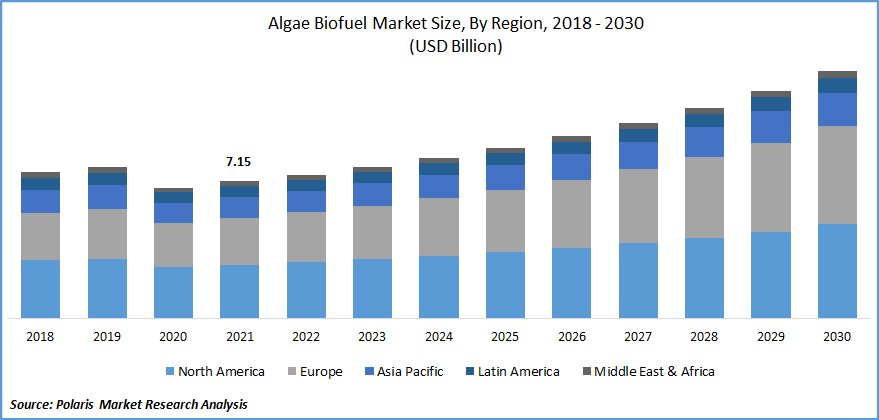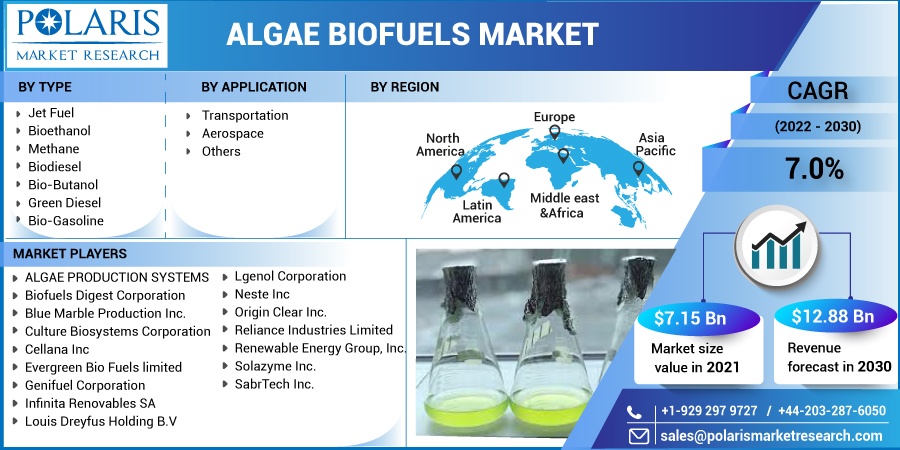
Algae Biofuel Market Share, Size, Trends, Industry Analysis Report, By Type (Jet Fuel, Bioethanol, Methane, Biodiesel, Bio-Butanol, Green Diesel, Bio-Gasoline, Others); By Application; By Region; Segment Forecast, 2022 - 2030
- Published Date:Jul-2022
- Pages: 114
- Format: PDF
- Report ID: PM1189
- Base Year: 2021
- Historical Data: 2018-2020
Report Outlook
The global algae biofuels market was valued at USD 7.15 billion in 2021 and is expected to grow at a CAGR of 7.0% during the forecast period. The demand for bio-based resources to substitute traditional fossil fuel goods is what is driving this increase. With the producers' initiatives to commercialize the product, the significant potential of algae to create bioethanol, biodiesel, drop-in biofuel, and hydrocarbons is anticipated to open up new opportunities for the sector.

Know more about this report: Request for sample pages
This has surfaced as a special alternative since it can get beyond the problems with second-generation crop-based biofuels. Species including Botryococcus braunii, Crypthecodinium cohnii, and Nitzschia are used to produce algae biofuel. A strong technological methodology has also been developed for the use of contemporary biochemical engineering processes. To make the construction of such biofuel economically viable and environmentally sustainable, business and science are working nonstop.
The algal biofuel market has developed quickly due to the many beneficial properties of the fuel. Their production is very important due to the potential for larger yields than some of the crop-based fuels already in use, high energy material, quick microbial development, and high biodegradability. Bioethanol, jet fuel, bio-butanol, green diesel, biodiesel, methane, and bio-gasoline are among the different kinds of fuels that can be acquired.
The novel COVID strain's emergence has harmed the health care system in many industrialized and developing nations. There is a shortage of hospital personnel, medications, oxygen beds, and ventilators. Disruptions in supply networks are causing problems in production processes across several nations.
The global algae biofuel market was negatively impacted by the advent of the new coronavirus. Government-imposed precautionary lockdowns and their associated limitations had a significant impact on the industry. The algae biofuel market has been negatively impacted by the disruption of supply chains, which has led to production activities being stopped in numerous nations.
The general economic condition of the majority of people has been severely damaged by the outbreak; therefore, demand from consumers has reduced as they are now more focused on cutting non-essential expenses from their budgets.

Know more about this report: Request for sample pages
Industry Dynamics
Growth Drivers
The development of the detergent industry in developing nations, expanding energy requirements from various end-use industries, and rising interest in renewable energy sources are all anticipated to drive the growth of the algae biofuel market over the anticipated time frame. Additionally, it is predicted that the market growth will be accelerated by the rapid expansion of the industry brought on by the rising need for fuels across a wide range of end-use industries, as well as the developing demand for green and sustainable energy sources.
The demand for affordable fuels in the aviation industry is on the rise, which will accelerate the algae biofuel market. The development of the end-use industries is also anticipated to support the market's growth. The continuing search for affordable, environmentally friendly fuel alternatives to meet global objectives for carbon neutrality is anticipated to open up new opportunities to assist the growth of the algae biofuel market.
Report Segmentation
The market is primarily segmented based on type, application, and region.
|
By Type |
By Application |
By Region |
|
|
|
Know more about this report: Request for sample pages
Biofuel is Expected to Witness the Fastest Growth
The fact that agricultural areas used for growing food supplies should not be relocated makes employing algae a considerable advantage. They have the potential to provide at least 30 times more energy than the land-based crops now used to make fuels, according to the Department of Energy. Typically, aquatic unicellular green algae are utilized to produce biodiesel. Due to various their relatively high oil content and quick biomass synthesis, microalgae have long been recognized as possible viable sources for biofuel generation. The fact that agricultural areas used for growing food supplies should not be relocated makes employing algae for biofuels a considerable advantage.
Green Diesel Accounted for the Highest Market Share in 2021
In the field of renewable energy, they stand in for algae as a possible source of this fuel. The fact that land that would otherwise be utilized for growing food supplies does not need to be relocated is a significant advantage of such fuels. Also, they have the potential to increase energy production by 30 times compared to traditional land-based crops.
Algae-sourced sustainable diesel follows a drop-in system, which means that it can be used in place of petroleum fuel without requiring any engine modifications. Algal-produced vegetable oil is either consumed directly or refined further to produce various fuels used in a variety of applications. The worldwide algal biofuel market exhibits a vast panorama of well-positioned, large competitors with strong capital infrastructure alongside a line of new market entrants hoping to change the market dynamics through technological breakthroughs that will consolidate the algae biofuel market.
Transportation Industry Expected to Hold the Significant Revenue Share
The shortage of available renewable raw material sources is anticipated to rise with the automobile industry's rapid expansion due to rising consumer income and technical improvements. Because they have the potential to replace conventional diesel and gasoline products, transportation is predicted to be the industry's dominant application category.
One-third of the energy used worldwide was derived from petroleum products, such as jet fuel, diesel, gasoline, and fuel oil. The demand for new sustainable raw material sources is predicted to increase due to the automobile industry's rapid growth, which is being fueled by increased consumer income and technological advancements. Increasing demand for fuel in transportation applications is anticipated to compel manufacturers to increase their investment in R&D to enhance low-cost renewable fuel sources.
The Demand in North America is Expected to Witness Significant Growth
Algae biofuel is anticipated to have profitable markets in North America and Europe. The need for renewable transportation fuels is growing throughout many European economies. Several government programs to assist research into the commercial production of algal fuels have made North America a viable region. The Advanced Algal Systems initiative of the Bioenergy Technologies Office (BETO) encourages research and development (R&D) to lower the cost of manufacturing algal fuels and bio-based products. The initiative collaborates with partner organizations to create novel technologies and carry out interdisciplinary studies that might sustainably offer the potential for algal biomass fuel in the United States.
Due to the rising biomass output and maximum production rates in this region, For instance, the U.S. Department of Energy reported that the most enthusiastic production assumption predicted that the southwestern United States will have annual average algal biomass and oil productivity levels of about 31 g/m2 per day with 50% maximum dry oil content.
A unique situation has emerged as a result of this economic downturn and the critical need for increased and improved wastewater treatment in the United States. In the global market for algal fuel, Europe is anticipated to see a second high growth rate. The algae biofuel market in this country may rise to increase the production of energy through numerous government initiatives across Europe.
Competitive Insight
Some of the major players operating in the global market include ALGAE PRODUCTION SYSTEMS, Biofuels Digest Corporation, Blue Marble Production Inc., Culture Biosystems Corporation, Cellana Inc, Evergreen Bio Fuels limited, Genifuel Corporation, Infinita Renovables SA, Louis Dreyfus Holding B.V, Lgenol Corporation, Neste Inc, Origin Clear Inc., Reliance Industries Limited, Renewable Energy Group, Inc., Solazyme Inc., and SabrTech Inc.
Recent Developments
In March 2022, Honda Motor Company is thinking about making its algae-growing technology, which could be used to absorb carbon and make plastics and other goods, more widely available.
Algae Biofuels Market Report Scope
|
Report Attributes |
Details |
|
Market size value in 2021 |
USD 7.15 billion |
|
Revenue forecast in 2030 |
USD 12.88 billion |
|
CAGR |
7.0% from 2022 - 2030 |
|
Base year |
2021 |
|
Historical data |
2018 - 2020 |
|
Forecast period |
2022 - 2030 |
|
Quantitative units |
Revenue in USD billion and CAGR from 2022 to 2030 |
|
Segments covered |
By Type, By Application, By Region |
|
Regional scope |
North America, Europe, Asia Pacific, Latin America, Middle East & Africa |
|
Key companies |
ALGAE PRODUCTION SYSTEMS, Biofuels Digest Corporation, Blue Marble Production Inc., Culture Biosystems Corporation, Cellana Inc, Evergreen Bio Fuels limited, Genifuel Corporation, Infinita Renovables SA, Louis Dreyfus Holding B.V, Lgenol Corporation, Neste Inc, Origin Clear Inc., Reliance Industries Limited, Renewable Energy Group, Inc., Solazyme Inc., and SabrTech Inc. |
